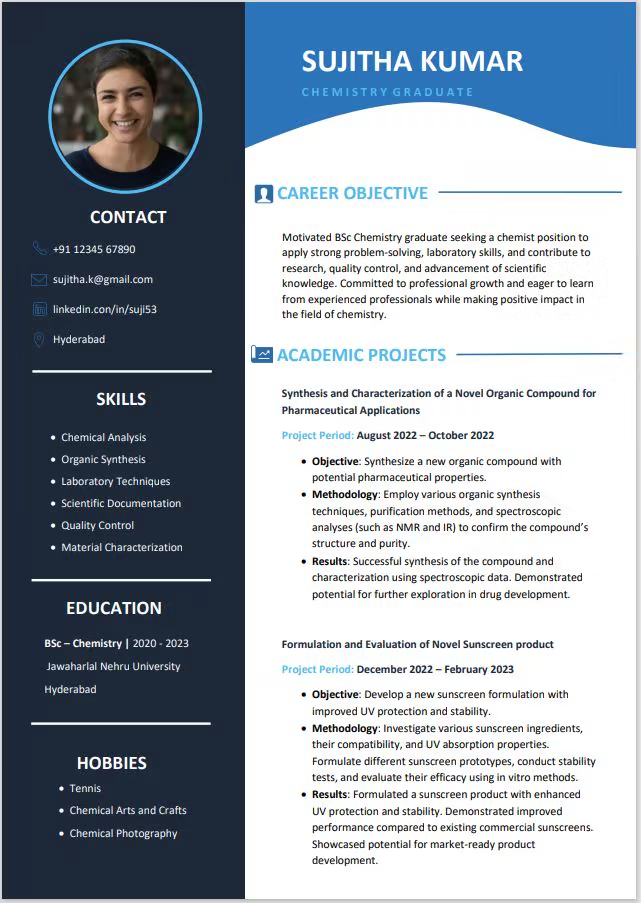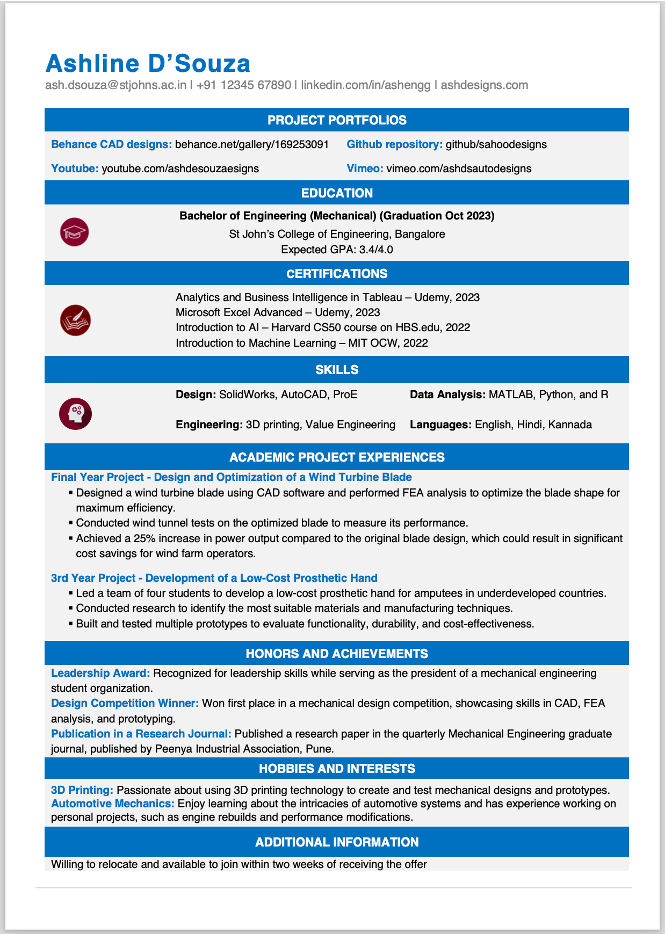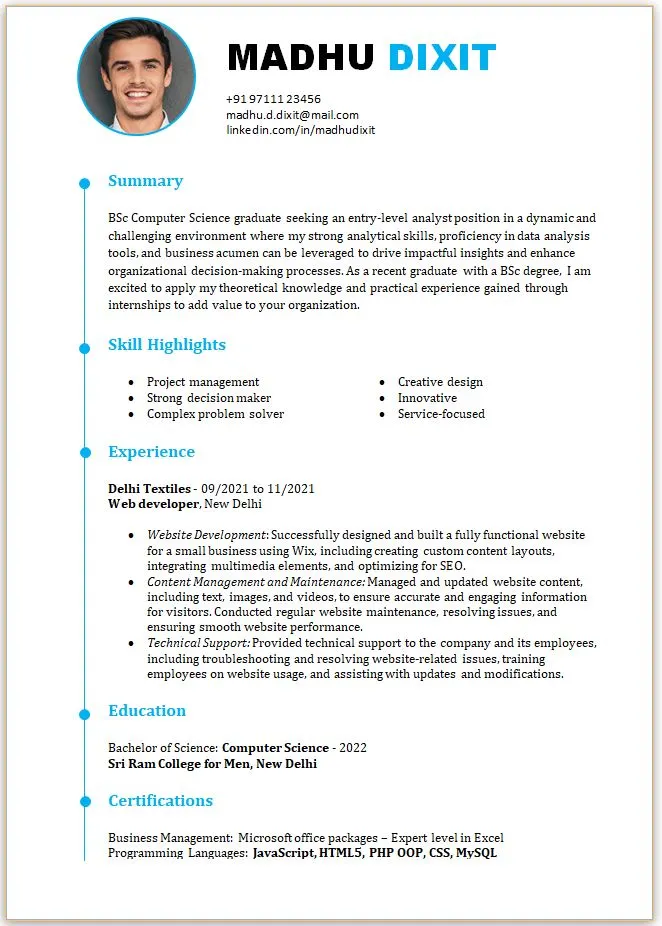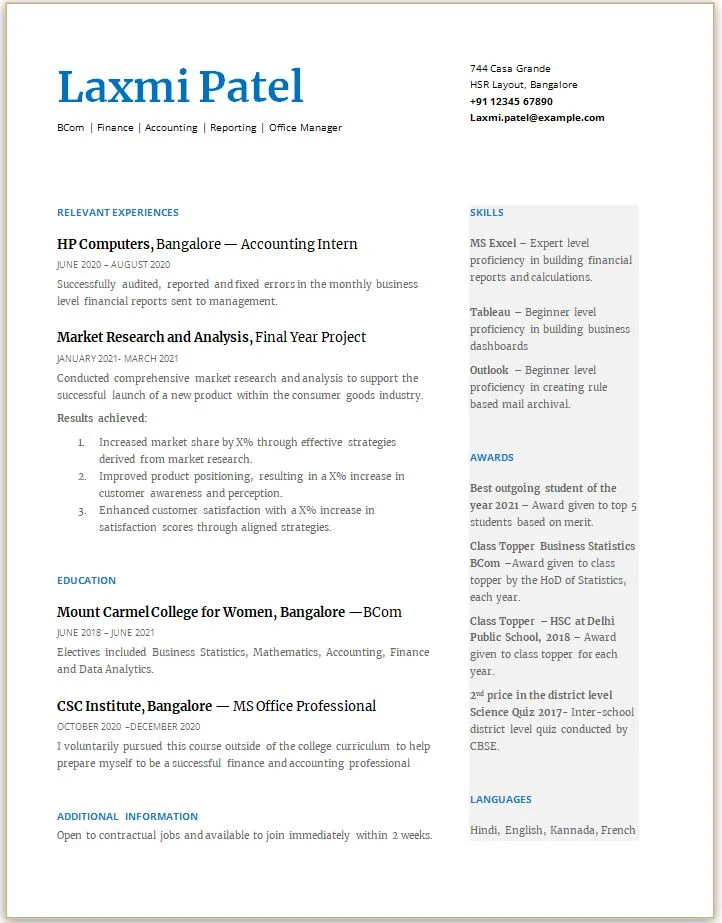Modern Resume
BSc Chemistry Student Resume
Student Resume
BScChem


Objective
Motivated BSc Chemistry graduate seeking a chemist position to apply strong problem-solving, laboratory skills, and contribute to research, quality control, and advancement of scientific knowledge. Committed to professional growth and eager to learn from experienced professionals while making positive impact in the field of chemistry.
Education
BSc Chemistry
Skills
1. Chemical Analysis
2. Organic Synthesis
3. Laboratory Techniques
4. Scientific Documentation
5. Quality Control
6. Material Characterization
Why did we list these as skills on the resume
1. Chemical Analysis:
This skill is directly related to the core of chemistry. Demonstrating proficiency in chemical analysis suggests that the candidate is well-versed in techniques for identifying and quantifying chemical compounds, which is essential for roles involving research, testing, and quality control.
2. Organic Synthesis:
Organic synthesis is a fundamental skill in chemistry, particularly for pharmaceutical, agrochemical, and material science industries. Highlighting this skill indicates the candidate's capability to design and execute chemical reactions to create new compounds.
3. Laboratory Techniques:
Laboratory techniques encompass a wide range of skills that are essential for working effectively in a laboratory setting. Mentioning these skills showcases the candidate's hands-on experience and familiarity with various equipment and procedures.
4. Scientific Documentation:
Proper documentation is crucial in scientific research and industry. Mentioning this skill demonstrates the candidate's ability to accurately record experimental procedures, observations, and results—an essential aspect of maintaining research integrity.
5. Quality Control:
Quality control is vital in industries such as manufacturing, pharmaceuticals, and food. This skill suggests that the candidate is knowledgeable about processes for ensuring the quality and consistency of products through testing and analysis.
6. Material Characterization:
Material characterization involves techniques to analyze the physical, chemical, and structural properties of materials. This skill is relevant for various industries, including polymers, nanotechnology, and materials science.
These skills collectively highlight the candidate's expertise in core areas of chemistry, making them a strong fit for roles in research, development, testing, quality assurance, and other fields that require a solid foundation in chemistry principles and techniques. When elaborating on these skills in the resume, you can provide specific examples of how you have applied these skills in academic projects, internships, or laboratory work to demonstrate your practical experience.
Projects
Project 1: Synthesis and Characterization of a Novel Organic Compound for Pharmaceutical Applications
Project Period: August 2022 – October 2022
Objective:
Synthesize a new organic compound with potential pharmaceutical properties.
Methodology:
Employ various organic synthesis techniques, purification methods, and spectroscopic analyses (such as NMR and IR) to confirm the compound’s structure and purity.
Results:
Successful synthesis of the compound and characterization using spectroscopic data. Demonstrated potential for further exploration in drug development.
Project 2: Formulation and Evaluation of Novel Sunscreen product
Project Period: December 2022 – February 2023
Objective:
Develop a new sunscreen formulation with improved UV protection and stability.
Methodology:
Investigate various sunscreen ingredients, their compatibility, and UV absorption properties. Formulate different sunscreen prototypes, conduct stability tests, and evaluate their efficacy using in vitro methods.
Results:
Formulated a sunscreen product with enhanced UV protection and stability. Demonstrated improved performance compared to existing commercial sunscreens. Showcased potential for market-ready product development.
Interests/Hobbies
Tennis:
This hobby can indicate several positive traits. Tennis requires physical fitness, coordination, and competitive spirit, which can reflect positively on your overall wellness and drive.
It also suggests that you are disciplined and capable of balancing work commitments with personal interests.
Additionally, participating in sports can indicate teamwork and communication skills if you play doubles or engage in social matches.
Chemical Arts and Crafts:
This unique hobby showcases your creativity and ability to apply chemical knowledge in practical and creative ways. It can also indicate attention to detail and a willingness to experiment and think outside the box. Mentioning this hobby can intrigue potential employers and demonstrate your passion for chemistry beyond academic or professional contexts.
Chemical Photography:
This hobby combines chemistry with a visual and artistic aspect. It showcases your interdisciplinary interests and your ability to merge scientific knowledge with creative pursuits. Chemical photography involves understanding the chemical processes behind developing images, highlighting your curiosity and willingness to delve into niche areas of chemistry.
These hobbies can help potential employers see you as a well-rounded individual with a range of skills and interests. They can also provide great conversation starters during interviews and networking opportunities. However, when including hobbies on a resume, be sure to select those that reflect positively on you as a candidate and align with the position you're applying for. In this case, the candidate's hobbies demonstrate creativity, scientific curiosity, physical activity, and the ability to balance diverse interests.
Additional Inputs
Career Options for BSc Chemistry Students
If you are a recent BSc Chemistry graduate, there are plenty of job functions and industries you can look to start your career in. BSc Chemistry graduates have a wide range of career options across various industries. Here are some potential career paths:
Research and Development:
Work as a research assistant or laboratory technician in research and development (R&D) departments of industries such as pharmaceuticals, chemicals, cosmetics, and materials. Conduct experiments, analyze data, and contribute to product development.
Quality Control/Quality Assurance:
Ensure the quality and consistency of products by performing quality control tests, inspections, and validations. Industries like pharmaceuticals, food and beverages, and manufacturing require professionals to ensure products meet regulatory standards.
Environmental Science and Consulting:
Address environmental issues related to pollution, waste management, and sustainability. Work with government agencies, environmental consultancies, or industries to ensure compliance with environmental regulations.
Pharmaceuticals and Healthcare:
Pursue roles in pharmaceutical companies, where you can be involved in drug development, quality control, formulation, regulatory affairs, or sales and marketing of pharmaceutical products.
Chemical Analysis and Testing Laboratories:
Join commercial laboratories where you can perform chemical testing, analysis, and characterization for various industries, including environmental, forensic, and materials testing.
Education and Academia:
Pursue further education (like a master's or PhD) and become a lecturer, professor, or researcher in academia. Contribute to scientific research, mentor students, and publish research findings.
Biotechnology and Biomedical Research:
Apply your knowledge in genetics, biochemistry, and molecular biology to work in biotechnology companies, focusing on research related to genetics, genomics, and molecular diagnostics.
Cosmetics and Personal Care:
Contribute to the development and testing of cosmetic and personal care products, ensuring safety, efficacy, and compliance with regulations.
Food and Beverage Industry:
Work in quality control, research, or regulatory affairs roles related to food safety, nutrition, flavor chemistry, and product development in the food and beverage industry.
Petrochemicals and Energy:
Be part of industries involved in refining, processing, and producing petrochemicals, energy sources, and materials. Roles may include process optimization, research, and environmental compliance.
Agriculture and Agrochemicals:
Contribute to the development of agricultural products, pesticides, and fertilizers. Roles can include research, testing, and regulatory affairs.
Sales and Marketing:
Use your technical knowledge to work in sales and marketing roles for chemical and pharmaceutical products. Communicate the benefits of products to clients and address technical queries.
Government and Regulatory Agencies:
Work for regulatory agencies related to health, safety, environment, and consumer protection, ensuring that products and processes comply with regulations.
Materials Science and Nanotechnology:
Explore roles related to materials synthesis, characterization, and applications in industries such as electronics, optics, and energy storage.
These are just a few examples, and the opportunities are extensive. Consider your strengths, interests, and the industry sectors that intrigue you the most when exploring potential career options as a BSc Chemistry graduate.


